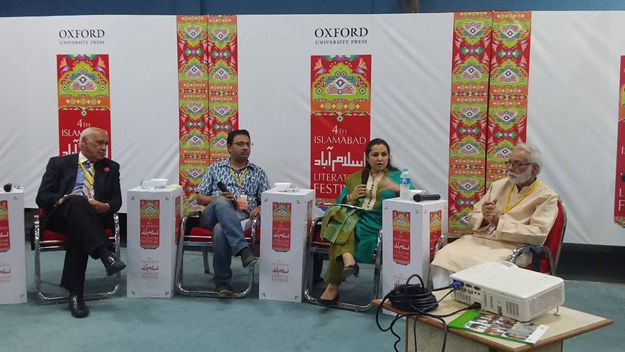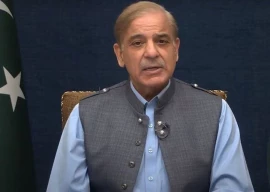
A discussion on Pakistan’s media on Sunday found that the industry, while certainly more independent than years past, is also following dangerous patterns of conformity and is no longer a watchdog for public interest.
New Delhi-based activist Saif Mahmood moderated a session titled “Media: More Independent, Less Responsible’. He began by quoting an IBA-USAID study where Pakistan’s media was given a responsibility score of 5.46, and an independence score of 5.74, and added that these were reasonably good scores in his opinion.
Journalist Rashed Rahman gave context to the gathering by explaining how media in Pakistan had been under “draconian censorship” for over four decades. He said that back then, journalism was an even riskier profession than it was today, and that “evening knocks”, were commonplace and journalists going missing was a matter of public record.

Given this history, he maintained that 24/7 television today had both a bright and dark side. Rahman also believed that the unprecedented hiring in the early 2000s to fill a large number of positions were responsible for the present state of the media. He said the lack of screening for qualifications and professionalism “reflected in the media today”.
He said that while the media may be said to be independent, that very independence was currently being “strangled”, at that there was a “grim trend towards conformity” on electronic media. Rahman opined that it seemed all of the media was taking its cues from a single Twitter account, and that the news agenda was “being dictated from a single source”.
Regarding print media, he said editors as an institution were under threat, and that given transition in managements at the various media houses, managements no longer stood by their editors, making it difficult to assert independent voices.
Both print and electronic content was also being commercialised and “dumbed down” in his opinion. He said he was weary of “looking for news in between advertisements”.
Anchorperson Nasim Zehra said the media today extended well beyond television and radio. “Information and facts constitute justice in a society,” she said, referring to the explosive proliferation of online news sources. “The media pilots the emotions and minds of society,” Zehra added.
Speaking about the external pressures under which media houses operated, Zehra said, “Establishment pressure in Pakistan is an old story,” but added that “nobody can control thought, though attempts are made”.
She also reminded the audience, comprising of many including media professionals, that other powerful institutions in the country also exerted influence over the media, including the Prime Minister Office, adding that “many elements were at play”, and that the people would have to continuously account the media’s coverage of the issues to ensure that the independence that was being discussed had actual significance.
She also said the media industry of today was revelling in the freedoms won for it by veteran journalists such as M Ziauddin and Nisar Osmani, who took firm stands when little leeway was on offer.
On the question of self-regulation, Rahman said this was imperative for media houses, otherwise the state would have to intervene. He opined that the Pakistan Electronic Media Regulatory Authority was “largely toothless”.
Panellist Fakir Syed Aijazuddin, an accountant, termed the media an “aggregation of instruments of interests”. He said the country lacked part of Jinnah’s mantra — discipline, which he believed was a prerequisite for self-regulation. He believed few in the media landscape of today would “risk their necks” to rectify the current situation.
Published in The Express Tribune, April 18th, 2016.








1726732405-0/Express-Tribune-Web-(15)1726732405-0-270x192.webp)








COMMENTS
Comments are moderated and generally will be posted if they are on-topic and not abusive.
For more information, please see our Comments FAQ